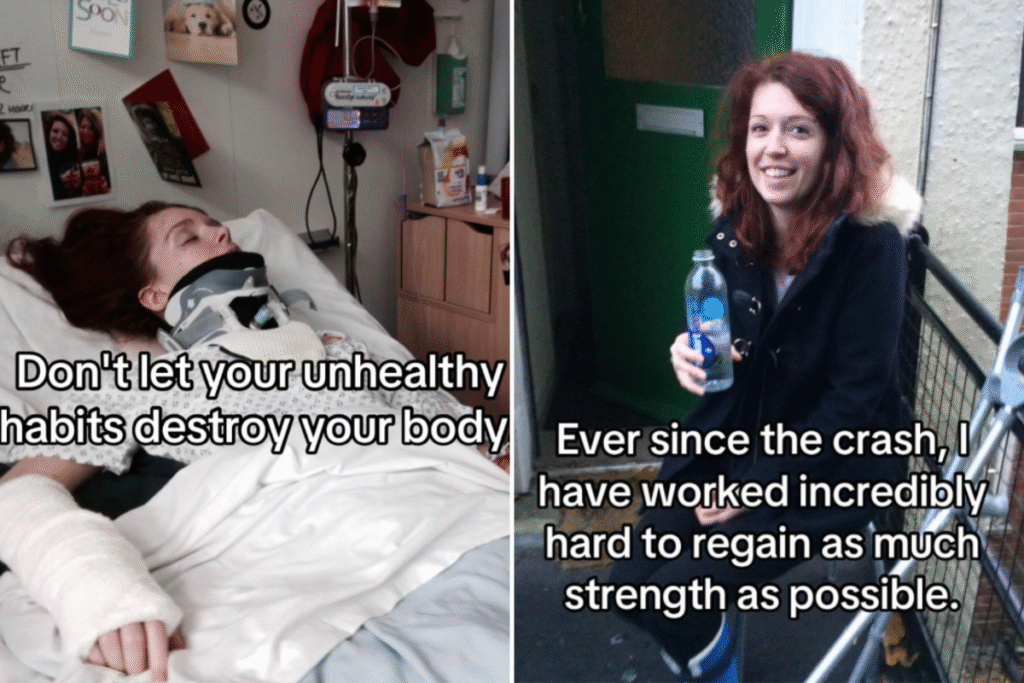It may be more than 11 years ago, but Harriet Barnsley will never forget the events of May 31, 2014 when she was hit by a drunk driver and her life was changed forever.
Barnsley was standing at a bus stop with a friend, Rebecca, when they were hit by the driver, who was driving at 101 miles per hour. Barnsley, from Birmingham, U.K., told Newsweek that they “bounced off the car” and were thrown 164 feet in the air.
That moment changed everything, as Barnsley was placed in a month-long coma, and her best friend died instantly.
“When I was in a coma, they didn’t know if I’d ever regain consciousness or what the damage would be,” Barnsley said. “The brain injury has left me with memory loss, increased bluntness, a lack of filter, chronic fatigue syndrome, and bipolar disorder with psychosis.”
Barnsley suffered a subarachnoid hemorrhage, brain bleeding and bruising, double vision, multiple broken bones (include five in her neck and her collar bone), her right hip needed reconstruction, and her sciatic nerve was severed.
Prior to that day, Barnsley was fit, healthy, and incredibly active. She loved running, worked 14-hour shifts as a waitress, and felt capable of anything.
After a month, Barnsley came out of the coma and was faced with the reality of what had happened.
She said: “It was like waking from a very long, deep sleep. I kept dipping in and out of consciousness. I couldn’t keep track of anything. I just kept surrendering to the situation and lay there waiting it out. I figured that, because I was unable to do anything, all I could do was wait.
“It was an incredibly slow and painful process. I had to relearn everything: how to speak, swallow and move.”
It was 111 days before she could stand again, 116 days before taking her first steps, and 183 days before she could put on her own shoes.
For many weeks, Barnsley suffered with short-term memory loss and repeatedly fell in and out of consciousness. When she was told that her best friend had been killed, Barnsley didn’t want to believe it, but she knew she had to.
From then on, she made the decision “not to waste the second chance” she’d been granted at life. Now, Barnsley cherishes every day she has and every opportunity that comes her way.
“I never let frustrations get me down. I’ve tried my hardest at every stage of my recovery and continue to do so. I will never be fully recovered or back to normal. I have a new normal with varying energy levels and different issues that crop up as I go,” Barnsley said.
Living With Psychosis
It wasn’t just a physical recovery, but a mental one too.
Barnsley struggled with psychosis since waking from the coma as she believed everyone “was an actor pretending to be a doctor or a nurse.” She felt as though someone was going to pull back the curtain any moment and announce that it was all a performance.
At the time, Barnsley had no idea that she was struggling with psychosis, and for a long while she kept the experience to herself.
She said: “In 2015, I was told by a neuropsychologist that I wasn’t facing what happened to me. I was boxing my emotions, and this was going to lead to catastrophic consequences. I ignored this and threw myself into my physical recovery instead of letting myself feel the pain of what I’d lost. Then in 2019, I developed full-blown psychosis and went into a living nightmare.”
Psychosis temporarily interferes with the brain’s ability to make out reality, causing disruptions to thoughts and perceptions. Signs of psychosis can include hearing, seeing, or believing things that others don’t, suspiciousness or extreme uneasiness, inappropriate emotions and trouble concentrating.
It can come and go in episodes of varying severity, with the National Alliance on Mental Illness suggesting that it affects about three in 100 people during their lives.
When experiencing psychosis, Barnsley loses contact with reality and gets “completely absorbed in delusions.” It takes over her entire world and it’s led her to believe that she could read minds, control things with her mind, that she’s being followed or persecuted, that she’s holy, or that she’s invincible and capable of performing miracles.
For a time, she also believed that she was living in hell and was being “tortured on repeat, every single day.”
Now, Barnsley works hard to not chase the delusions. She also takes daily antipsychotic medication and makes sure to get enough sleep and exercise, which has proven transformative.
“I always prioritize exercise and self-care, which means I’m always as physically and mentally strong as I can be to deal with life’s challenges whenever they arise. I experience a few background symptoms, but this is something I’ve come to accept and live alongside, rather than worry about,” Barnsley said.
Sharing Her Story Online
Barnsley has shared her experience on social media (@hazzzzab on TikTok) as a way to raise awareness for dangerous driving and educate people on psychosis. Her videos have generated an overwhelmingly positive response and she’s been encouraged to keep spreading the word.
It’s an ongoing battle, but Barnsley is hopeful and optimistic once more.
“Dangerous driving is often accepted as inevitable, and I want to change this,” Barnsley told Newsweek. “Psychosis is frequently misunderstood, and I want to change this too. Sharing online seems the most effective way to raise awareness about both things.
“The main thing I’d love to convey is the importance of looking after your body. Exercising regularly is key. So many people take this for granted, but having a body that is now disabled, the idea of having an ‘able’ body is the absolute dream. I implore you to take care of your body, don’t take it for granted. It’s the only one you’ll ever have.”
Is there a health issue that’s worrying you? Let us know via health@newsweek.com. We can ask experts for advice, and your story could be featured on Newsweek.
Read the full article here














